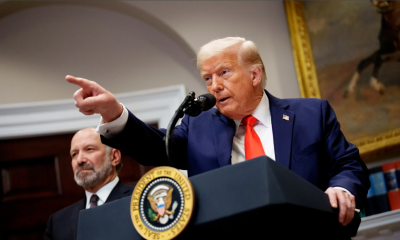Latest
DOGE Uncovers Alarming Pattern of Noncitizen Voting, Public Benefit Abuse

A recent investigation by DOGE has brought to light a concerning trend related to voting and public resource usage. The findings suggest there may be patterns worth further examination involving individuals who are not citizens.
The Department of Government Efficiency (DOGE), a newly empowered federal agency co-led by Elon Musk and longtime investor Antonio Gracias, has initiated a sweeping investigation into alleged voter fraud involving noncitizens in the United States. The agency, formed to enhance transparency and accountability in government systems, is now focusing on uncovering instances where individuals without U.S. citizenship may have registered to vote—and in some cases, cast ballots—in federal elections. This initiative follows a data-driven strategy that cross-checks immigration, benefits, and voting databases in a way that was not previously possible at the federal level.
The investigation is based on an executive order signed by President Trump in early 2025, titled “Preserving and Protecting the Integrity of American Elections.” The order authorized an unprecedented level of cooperation and data-sharing between federal agencies, enabling investigators to track potential irregularities across different systems. Antonio Gracias, speaking at the All-In summit in Miami, emphasized that this interagency coordination is key to the operation’s success. According to Gracias, the early stages of sampling efforts in a handful of states have already resulted in several arrests and one formal indictment, with more cases expected to surface as the inquiry deepens.
DOGE’s methodology involves using data from the Department of Homeland Security (DHS), cross-referencing it with state voter rolls, and identifying discrepancies that suggest illegal voting activity. Once these potential violations are flagged, the cases are forwarded to Homeland Security Investigations (HSI), which has the authority to subpoena voter records and conduct interviews to confirm or refute the allegations. Gracias noted that this process is rigorous and often slow, but necessary to ensure accuracy and accountability.
A major area of concern uncovered by DOGE involves the use of legally obtained Social Security Numbers (SSNs) by noncitizens. Gracias explained that many of these individuals acquire SSNs through lawful channels—such as asylum claims or special visa programs—often by filing Form I-765 to receive work authorization. While the SSNs are legitimate, they have reportedly been used not only to apply for federal and state benefits—including Medicaid, unemployment insurance, and student aid—but also to register to vote. This overlap between benefits access and electoral participation has alarmed DOGE officials, who argue it reveals systemic vulnerabilities in both areas.
Internal DOGE data shared publicly by Musk and Gracias at a Wisconsin rally and reported by the New York Post indicated that over 2 million noncitizens received SSNs in fiscal year 2024. The numbers for 2023 and 2025 were each estimated to be around 1 million. While receiving an SSN does not automatically imply fraudulent activity, Gracias argued that the scale of the distribution shows just how easily gaps in the system can be exploited. He credited the Trump administration’s executive order for making it possible to connect data from disparate government systems—immigration, public benefits, and voter registration—something he described as unprecedented.
One particularly troubling case highlighted by DOGE involves an Iraqi national who was indicted for illegally voting in the 2020 presidential election in New York. According to Gracias, the individual had a criminal record, including a prison sentence for a violent offense, and had received tens of thousands of dollars in Medicaid benefits while residing in the U.S. DOGE believes he is now back in Iraq but remains traceable through his online activity, including a Facebook account accessed from an IP address in that country. Gracias praised the efforts of HSI and the Department of Justice (DOJ) for tracking the individual and building a case despite the challenges involved.
Gracias stressed that the cases made public so far represent only a small portion of what may be a much larger issue. “This is the tip of the iceberg,” he said, cautioning that while it is too early to estimate the full scale of the problem, the data continues to grow. He also mentioned that DOGE’s technical team is capable of identifying 10 to 20 suspect voter cases per state per day through sampling methods. The DOJ has since asked each state to contribute a minimum of 10 to 20 cases to aid the ongoing federal investigation.
As the probe continues, DOGE officials have signaled that they expect the number of confirmed noncitizen voting incidents to rise. The agency’s work has already sparked debates about voter ID laws, immigration oversight, and public benefits eligibility, with implications likely to shape national policy discussions in the months ahead.
WATCH:
Scroll down to leave a comment and share your thoughts.
-

 Latest6 months ago
Latest6 months ago𝗔𝗹𝗹 𝗼𝗳 𝘁𝗵𝗲 𝗻𝗮𝗺𝗲𝘀 𝗺𝗲𝗻𝘁𝗶𝗼𝗻𝗲𝗱 𝗶𝗻 𝘁𝗵𝗲 𝗻𝗲𝘄 𝗝𝗲𝗳𝗳𝗿𝗲𝘆 𝗘𝗽𝘀𝘁𝗲𝗶𝗻 𝗱𝗼𝗰𝘂𝗺𝗲𝗻𝘁𝘀.
-

 Latest8 months ago
Latest8 months agoParis Hilton and Kanye Connected? “They Held Me Down, Spread My Legs…” [WARNING: Graphic]
-

 Latest7 months ago
Latest7 months agoHistoric Verdict Rocks America — Donald Trump Officially Convicted in a Turning Point No One Saw Coming
-

 Latest8 months ago
Latest8 months agoAlex Jones Exposes What’s Going On With Dan Bongino
-

 Latest5 months ago
Latest5 months agoProminent Republican Politician SWITCHES To Democrat Party
-

 Latest5 months ago
Latest5 months agoBREAKING: Supreme Court Responds to Gov. Greg Abbott’s Emergency Petition to REMOVE Runaway Democrat Leader
-

 Latest5 months ago
Latest5 months agoBOMBSHELL: President Trump Confirms Joe Biden Dead Since 2020!
-

 Latest6 months ago
Latest6 months agoBREAKING: President Trump drops a new message for America — and it changes everything.
